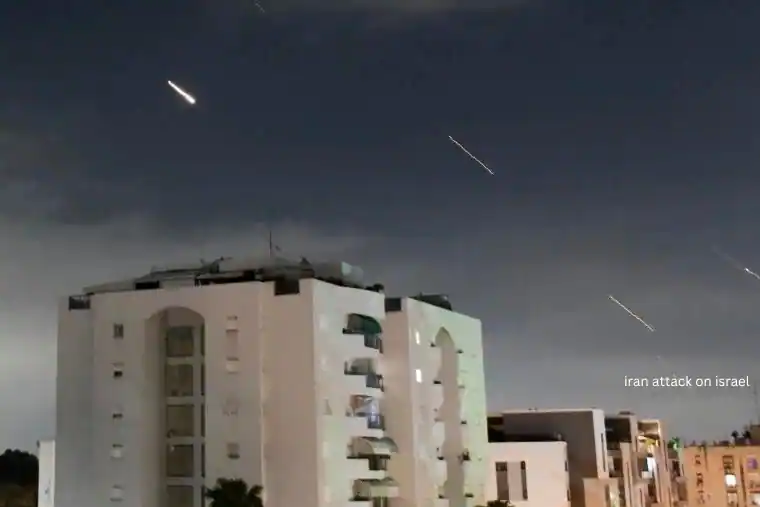Introduction to the Conflict
Tensions are escalating in the Middle East as Iran launches a daring attack on Israel, sending shockwaves across the region. The conflict between these two powerhouses has reached a critical juncture, sparking concerns about potential ramifications and international involvement. Let’s delve into the details of this breaking news and uncover what you need to know about Iran’s recent aggression towards Israel.
Iran’s History of Tensions with Israel
In the volatile landscape of the Middle East, Iran and Israel have a long-standing history of tensions fraught with political, ideological, and religious complexities. The roots of their animosity can be traced back to the Iranian revolution in 1979 when Ayatollah Khomeini came to power, ushering in an era of anti-Israel rhetoric.
Iran’s support for militant groups like Hezbollah and Hamas has further fueled hostilities with Israel, as these groups have targeted Israeli civilians and infrastructure over the years. Additionally, Iran’s pursuit of nuclear capabilities has raised alarms in Tel Aviv, which sees it as a direct threat to its security.
On the diplomatic front, Iran does not recognize Israel as a legitimate state and often calls for its destruction. This stance has created a deep-seated mistrust between the two nations that continues to simmer beneath the surface, ready to erupt at any moment.
Details of the Attack
The recent attack launched by Iran on Israel has sent shockwaves through the region, igniting fears of escalating tensions. The details of the attack are still emerging, but initial reports indicate that Iranian forces targeted multiple locations in Israel with missiles and drones. The attack is believed to be a response to previous airstrikes carried out by Israel on Iranian-backed militias in Syria.
This brazen act of aggression has raised concerns about the potential for further violence and instability in the already volatile Middle East. Israeli defense systems were activated to intercept incoming threats, but some projectiles managed to reach their targets, causing damage and casualties.
The precise motives behind Iran’s decision to launch this attack remain unclear, but it underscores the deep-seated animosity between these two longtime adversaries. As both countries vow retaliation and show no signs of backing down, the situation remains fluid and unpredictable.
Stay tuned for updates as more information becomes available on this developing story.
Israel’s Response and Potential Ramifications
Israel swiftly retaliated to Iran’s attack with a series of targeted airstrikes on Iranian military positions in Syria. The Israeli Defense Forces made it clear that they will not tolerate any aggression against their nation or its citizens. This escalation has raised concerns about the potential for further violence in the already volatile region.
The repercussions of this exchange of hostilities could have far-reaching consequences, leading to a wider conflict involving other regional players. Israel’s response underscores its commitment to safeguarding its sovereignty and protecting its people at all costs. The situation remains fluid, with the possibility of continued clashes between the two adversaries looming large.
As tensions continue to simmer, the international community is closely monitoring the developments and urging restraint from both sides. Any misstep or miscalculation could trigger a full-blown crisis with devastating effects for all involved parties. It is imperative for diplomatic efforts to de-escalate the situation before it spirals out of control.
International Reactions and Involvement
As news of the Iran attack on Israel spreads across the globe, international reactions and involvement are swift and varied. Countries around the world are closely monitoring the situation, with many expressing concern over the escalation of tensions in the region.
Key players such as the United States, Russia, and European nations are likely to issue statements condemning the attack and calling for restraint from both Iran and Israel. The United Nations Security Council is expected to convene an emergency meeting to address the crisis and discuss potential diplomatic solutions.
Regional powers like Saudi Arabia, Turkey, and Egypt may also weigh in on the conflict, either voicing support for Israel or urging a de-escalation of hostilities. The global community is watching closely as this latest flare-up threatens to destabilize an already volatile region.
Possible Outcomes and Future Implications
As tensions escalate between Iran and Israel following the recent attack, there are various possible outcomes and future implications that could unfold in the coming days. One potential consequence is a heightened military response from Israel, leading to further escalation of violence in the region. This could result in increased instability and insecurity for civilians on both sides.
Moreover, international actors may be drawn into the conflict, either diplomatically or through strategic alliances with either Iran or Israel. The involvement of global powers could complicate the situation even further and potentially lead to a broader regional conflict.
Additionally, economic repercussions such as fluctuating oil prices and market volatility could arise as a result of this heightened tension between two key players in the Middle East. The impact of these events on global politics and security dynamics remains uncertain at this stage but warrants close monitoring by stakeholders worldwide.
Conclusion
In times of heightened tensions and conflict, it’s crucial to stay informed and aware of the latest developments. The recent attack by Iran on Israel has once again underscored the volatile nature of the region and the complex geopolitical dynamics at play.
As we wait for further updates on Israel’s response and potential ramifications, it is evident that international involvement will be key in shaping the outcomes of this crisis. The eyes of the world are on the situation unfolding in the Middle East, as countries weigh their options and consider their alliances.
The future implications of this attack remain uncertain, but one thing is clear – a peaceful resolution is essential to prevent further escalation and loss of life. As we navigate through these challenging times, let us hope for dialogue, diplomacy, and a path towards de-escalation for the sake of stability in the region.
Stay tuned for more updates as this story continues to unfold.



